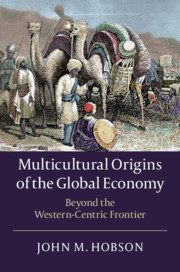Book contents
- Multicultural Origins of the Global Economy
- Multicultural Origins of the Global Economy
- Copyright page
- Dedication
- Contents
- Figures
- Tables
- Acknowledgements
- 1 Mapping a New Global Political Economy
- Part I Multicultural Origins of the First (Historical Capitalist) Global Economy, 1500–1850
- 2 Going Global 1.0
- 3 The Afro-Indian Pivot (I)
- 4 The Afro-Indian Pivot (II)
- 5 Entangled Indo-European Agencies
- 6 Indian Merchant-Financial Capitalists
- Part II What Was Global about the First Global Economy, 1500–c. 1850?
- Part III Empire and the First Global Economy in the Making of Modern Industrial Capitalism, 1500–1800
- Part IV The Second Great Divergence, 1600–1800: Differing ‘Developmental Architectures’ in Global Contexts
- Part V Rehabilitating and Provincialising Western Imperialism: Afro-Asians inside and outside the Shadow of Empire
- Book part
- Bibliography
- Index
2 - Going Global 1.0
Chinese Agency in the Making of the First Global Economy
from Part I - Multicultural Origins of the First (Historical Capitalist) Global Economy, 1500–1850
Published online by Cambridge University Press: 17 December 2020
- Multicultural Origins of the Global Economy
- Multicultural Origins of the Global Economy
- Copyright page
- Dedication
- Contents
- Figures
- Tables
- Acknowledgements
- 1 Mapping a New Global Political Economy
- Part I Multicultural Origins of the First (Historical Capitalist) Global Economy, 1500–1850
- 2 Going Global 1.0
- 3 The Afro-Indian Pivot (I)
- 4 The Afro-Indian Pivot (II)
- 5 Entangled Indo-European Agencies
- 6 Indian Merchant-Financial Capitalists
- Part II What Was Global about the First Global Economy, 1500–c. 1850?
- Part III Empire and the First Global Economy in the Making of Modern Industrial Capitalism, 1500–1800
- Part IV The Second Great Divergence, 1600–1800: Differing ‘Developmental Architectures’ in Global Contexts
- Part V Rehabilitating and Provincialising Western Imperialism: Afro-Asians inside and outside the Shadow of Empire
- Book part
- Bibliography
- Index
Summary
Chapter 2 is the first of five chapters that highlights the interconnections between Western and non-Western agency in the making of the first global economy (FGE), which existed between roughly 1500 and 1850. This chapter re-introduces China as an agent of the FGE, adopting a via media between the Sinocentrism of key parts of the California School on the one hand and Eurocentrism/Eurofetishism on the other (i.e., China's role in the FGE was more important than Eurocentrism allows for but was less pronounced than Sinocentrism presumes). Overall, it reveals how China was open to global trade and was an important (though not the key) driver of it. It critiques all of the standard Eurocentric claims concerning China's isolation from foreign trade, revealing as myths: the realisation of the state's official bans on foreign trade (section 1); the dominance of the Europeans in Chinese trade and the dominance of China over Britain (section 2); the Chinese tribute system (section 3); the Canton System (section 4); and China's heavily protectionist trade regime (section 5). The chapter closes with a detailed analysis as to why Qing China moved to freer trade after 1684 while Britain moved in the opposite direction to extreme protectionism.
- Type
- Chapter
- Information
- Multicultural Origins of the Global EconomyBeyond the Western-Centric Frontier, pp. 43 - 80Publisher: Cambridge University PressPrint publication year: 2020



